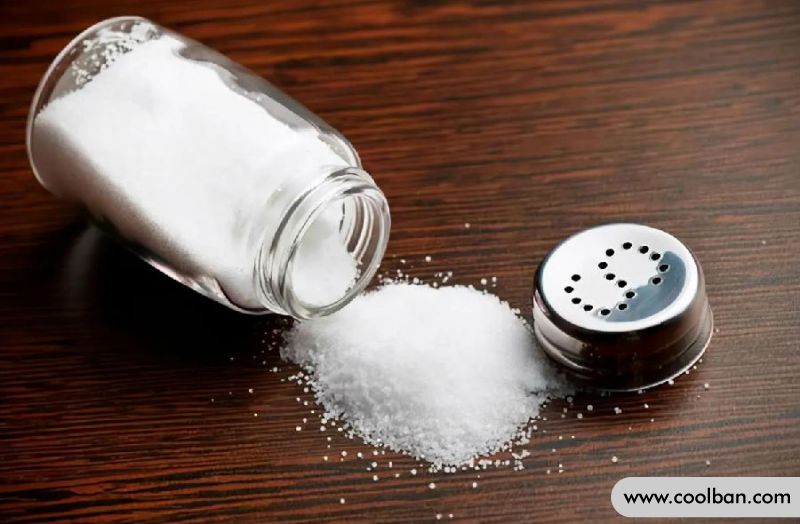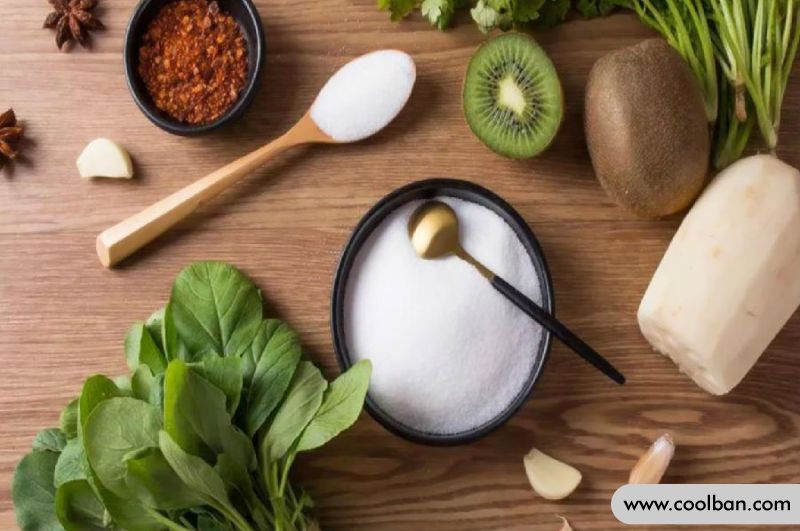How old can a baby eat salt? What are the effects of eating salt too early?
2022-04-17
As we all know, salt can be said that the human body needs to consume every day. The effect of salt on the human body is not only for seasoning, but for maintaining the balance of osmotic pressure and other physiological needs of the human body. So what are the dangers of eating too much salt in babies? Can babies eat salt?

Is it okay for a one-year-old baby to eat salt ?
One-year-old babies can add salt in moderation.
The sodium contained in salt is necessary for babies over 1 year old. Especially in the summer, or when you're sweating profusely, a lack of salt can lead to a breakdown. Around 1 year old, when rotten noodles and soft rice gradually become the staple food of babies, salt can be added appropriately, but the later the better, the total amount added cannot be compared with adults, so it needs to be strictly controlled, and it should be controlled at about 1 gram. Up to 2 grams. Children with heart disease, nephritis, and respiratory infections should limit salt. Do not give your baby MSG before the age of 3. If MSG is added, the salt should be reduced. Of course, you can also choose baby soy sauce, the conversion method is that every 15 ml of soy sauce is equivalent to 1 gram of salt.
It’s important to note that between 7 and 12 months, your baby’s salt needs increase slightly to around 1 gram; children 1 to 3 years old need less than 2 grams of salt per day (equivalent to 0.8 grams of sodium per day). Some moms are ignoring the invisible salt when they cook for their kids. The most common invisible salts are pickles, salted fish, and bacon. To keep your baby's taste light, try eliminating these foods from your diet.

When can I give baby salt?
Babies as young as six months can start adding small amounts of salt.
Babies are far more sensitive to salt than adults. When the salt content in the food is 0.25%, adults think it is bland, but infants and young children eat it as salty. Over time, the baby's taste will become heavier and heavier. At the same time, the human body has a limited demand for salt,6 Before a month, the baby's digestion and kidney function are not sound, and excessive salt intake will increase the burden on the kidneys. This is also the reason for the high incidence of upper respiratory tract infections in infants and young children, which may hinder the body's absorption of zinc.
Around 6 months is a critical period for the development of taste buds and the formation of taste preferences. At this time, children should be encouraged to accept rich and varied foods and feel the original taste of different foods. According to the recommendation of the Chinese Nutrition Society, the sodium intake of infants and young children within 6 months is about 200 mg, which is equivalent to 0.5 grams of salt. Breast milk or formula, along with your baby's own metabolic reserves, can provide enough sodium for growth without additional supplementation.
Around 1 year old, when rotten noodles and soft rice gradually become the baby's staple food, salt can be added appropriately, but the later the better, it should be controlled at about 1 gram, and no more than 2 grams at most. Children with heart disease, nephritis, and respiratory infections should limit salt. Do not give your baby MSG before the age of 3. If MSG is added, the salt should be reduced.
If you want to control the salt content for your baby, you may wish to add salt after the meal is ready and served on the table. At this time, the salt is attached to the surface of the food, and a little bit, you can eat the salty taste.

Premature feeding Adverse effects of salt for babies
Babies are immature and much more fragile than adults, so it is not good to let babies eat salt too early. Now, let's take a look at the adverse effects of giving your baby salt early.
Impact 1: The baby's kidney function is not fully developed, and it is not enough to penetrate too much salt. Excessive salt intake will increase the burden on the kidneys and the heart, thus affecting the growth and development of the baby.
Impact 2: Excessive intake of salt will inhibit the reproduction of oral mucosal epithelial cells, reduce oral saliva secretion, and reduce the content of lysozyme in saliva. Lysozyme has a bactericidal effect, and its reduction will reduce the defense function of the oral cavity against bacteria and viruses, thereby weakening the baby's disease resistance.
Influence 3: The baby's sense of taste is extremely sensitive. As long as they need a little salt, they will feel very good. If the baby eats too much salt, even if the baby thinks it is very salty, but because he can't express it, he can only slowly adapt to such a salty taste, and eventually the taste becomes heavier and stronger, and the development of taste is affected. Serious impact.
Impact 4: Excessive intake of salt can affect the absorption of zinc and increase the excretion of other minerals such as calcium.
Impact 5: The heavy-salt diet developed since childhood is not easy to correct, and it is easy to cause high blood pressure and other diseases.

Precautions for adding salt to complementary food
Can a mother add salt to her baby's food? Now, let's take a look at the precautions for adding salt in complementary foods!
Note 1: Babies need very little salt. Adults only need 6 grams of salt a day, and babies should be well below that. It is enough to add a little salt to the complementary food. In the future, as the child's age and age increase, the salt in the food can be moderately increased, but it is still necessary to eat less.
Note 2: Babies under 6 months do not need to add salt to complementary foods.
Note 3: Babies aged 1-3 should put as little salt as possible when cooking every day. In general, children between the ages of 1 and 6 should not consume more than 2 grams of salt per day. In fact, the natural flavors in fruits and vegetables are delicious for baby's very sensitive taste buds, and these foods also contain enough salt.
Note 4: It is recommended to use the method of "adding salt with meals" to control salt intake. That is, add less salt as the dish is cooked, or not add salt until the dish is cooked and brought to the table. This will make the salt only adhere to the surface of the dish, and it is delicious to put only a little salt, which can not only control the intake of salt, but also avoid the loss of iodine during high temperature cooking.

Is it okay for a one-year-old baby to eat salt ?
One-year-old babies can add salt in moderation.
The sodium contained in salt is necessary for babies over 1 year old. Especially in the summer, or when you're sweating profusely, a lack of salt can lead to a breakdown. Around 1 year old, when rotten noodles and soft rice gradually become the staple food of babies, salt can be added appropriately, but the later the better, the total amount added cannot be compared with adults, so it needs to be strictly controlled, and it should be controlled at about 1 gram. Up to 2 grams. Children with heart disease, nephritis, and respiratory infections should limit salt. Do not give your baby MSG before the age of 3. If MSG is added, the salt should be reduced. Of course, you can also choose baby soy sauce, the conversion method is that every 15 ml of soy sauce is equivalent to 1 gram of salt.
It’s important to note that between 7 and 12 months, your baby’s salt needs increase slightly to around 1 gram; children 1 to 3 years old need less than 2 grams of salt per day (equivalent to 0.8 grams of sodium per day). Some moms are ignoring the invisible salt when they cook for their kids. The most common invisible salts are pickles, salted fish, and bacon. To keep your baby's taste light, try eliminating these foods from your diet.

When can I give baby salt?
Babies as young as six months can start adding small amounts of salt.
Babies are far more sensitive to salt than adults. When the salt content in the food is 0.25%, adults think it is bland, but infants and young children eat it as salty. Over time, the baby's taste will become heavier and heavier. At the same time, the human body has a limited demand for salt,6 Before a month, the baby's digestion and kidney function are not sound, and excessive salt intake will increase the burden on the kidneys. This is also the reason for the high incidence of upper respiratory tract infections in infants and young children, which may hinder the body's absorption of zinc.
Around 6 months is a critical period for the development of taste buds and the formation of taste preferences. At this time, children should be encouraged to accept rich and varied foods and feel the original taste of different foods. According to the recommendation of the Chinese Nutrition Society, the sodium intake of infants and young children within 6 months is about 200 mg, which is equivalent to 0.5 grams of salt. Breast milk or formula, along with your baby's own metabolic reserves, can provide enough sodium for growth without additional supplementation.
Around 1 year old, when rotten noodles and soft rice gradually become the baby's staple food, salt can be added appropriately, but the later the better, it should be controlled at about 1 gram, and no more than 2 grams at most. Children with heart disease, nephritis, and respiratory infections should limit salt. Do not give your baby MSG before the age of 3. If MSG is added, the salt should be reduced.
If you want to control the salt content for your baby, you may wish to add salt after the meal is ready and served on the table. At this time, the salt is attached to the surface of the food, and a little bit, you can eat the salty taste.

Premature feeding Adverse effects of salt for babies
Babies are immature and much more fragile than adults, so it is not good to let babies eat salt too early. Now, let's take a look at the adverse effects of giving your baby salt early.
Impact 1: The baby's kidney function is not fully developed, and it is not enough to penetrate too much salt. Excessive salt intake will increase the burden on the kidneys and the heart, thus affecting the growth and development of the baby.
Impact 2: Excessive intake of salt will inhibit the reproduction of oral mucosal epithelial cells, reduce oral saliva secretion, and reduce the content of lysozyme in saliva. Lysozyme has a bactericidal effect, and its reduction will reduce the defense function of the oral cavity against bacteria and viruses, thereby weakening the baby's disease resistance.
Influence 3: The baby's sense of taste is extremely sensitive. As long as they need a little salt, they will feel very good. If the baby eats too much salt, even if the baby thinks it is very salty, but because he can't express it, he can only slowly adapt to such a salty taste, and eventually the taste becomes heavier and stronger, and the development of taste is affected. Serious impact.
Impact 4: Excessive intake of salt can affect the absorption of zinc and increase the excretion of other minerals such as calcium.
Impact 5: The heavy-salt diet developed since childhood is not easy to correct, and it is easy to cause high blood pressure and other diseases.

Precautions for adding salt to complementary food
Can a mother add salt to her baby's food? Now, let's take a look at the precautions for adding salt in complementary foods!
Note 1: Babies need very little salt. Adults only need 6 grams of salt a day, and babies should be well below that. It is enough to add a little salt to the complementary food. In the future, as the child's age and age increase, the salt in the food can be moderately increased, but it is still necessary to eat less.
Note 2: Babies under 6 months do not need to add salt to complementary foods.
Note 3: Babies aged 1-3 should put as little salt as possible when cooking every day. In general, children between the ages of 1 and 6 should not consume more than 2 grams of salt per day. In fact, the natural flavors in fruits and vegetables are delicious for baby's very sensitive taste buds, and these foods also contain enough salt.
Note 4: It is recommended to use the method of "adding salt with meals" to control salt intake. That is, add less salt as the dish is cooked, or not add salt until the dish is cooked and brought to the table. This will make the salt only adhere to the surface of the dish, and it is delicious to put only a little salt, which can not only control the intake of salt, but also avoid the loss of iodine during high temperature cooking.
